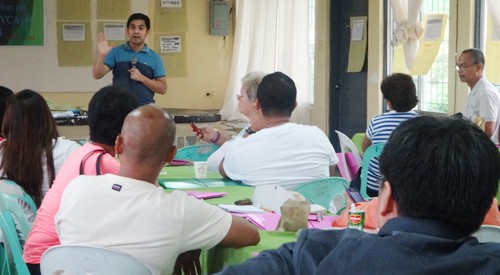 NPCO Planning Specialist Rey Lara says that it is high time to capacitate the coconut shell charcoal industry in the Province of Masbate.
NPCO Planning Specialist Rey Lara says that it is high time to capacitate the coconut shell charcoal industry in the Province of Masbate. Coconut shell charcoal eyed for PRDP investments in Masbate
October 20, 2014
MASBATE– Famous for cattle raising, gold mining, and marine sanctuaries, who would have thought that the country’s Rodeo Capital has more to offer—black gold better known as charcoal.
This was revealed in a stakeholders’ consultation on the value chain analysis (VCA) of coconut shell charcoal conducted by the Regional Program Coordination Office (RPCO) Region 5 headed by Social and Environmental Safeguards (SES) Unit Head Engr. Teodoro C. Eleda. The stakeholders’ consultation, which aimed to identify key constraints and opportunities in coconut shell charcoal making and formulate corresponding solutions to boost overall value chain competitiveness, was held on October 17, 2014 at the Department of Education Conference Hall in Masbate City.
Records from the Philippine Coconut Authority (PCA) show that Masbate is second highest to Camarines Sur in terms of coconut production volume in Bicol, is third on coconut plantation area, and ranks second to Sorsogon in terms of number of bearing trees throughout Bicol from 2010-2012. Thus, majority of the farmers in the island province depend on copra production for livelihood with abundant coconut shell as waste product in copra making. Masbate’s Provincial Program Management and Implementation Unit (PPMIU) therefore, saw the potential of coconut shell charcoal as a viable enterprise in the province. Value chain expert Rene Guarin did the VCA for coconut shell charcoal and results of the stakeholders’ consultation will be forwarded to him for finalization.
Coconut shell charcoal processor Vincent Flores, Supervising Agriculturist Grace Graciana Tagnipez, coconut farmer Neptali Candidatu and coconut shell charcoal traders Onofre Abaño and Dan Ribas presented an overview of their existing relations with the buyers, suppliers, and government agencies as well as their strengths and weaknesses as key players of the coconut shell charcoal industry in the province. Meanwhile, coconut farmer Evelyn Chiu, Flores, Abaño and Tagnipez shared their competitiveness vision of the industry in Masbate in the next three years including job generation through charcoal value-adding, improved farm-to-market roads, and establishment of a coconut shell charcoal processing plant. The stakeholders also conveyed issues and concerns affecting the coconut shell charcoal industry in the province like difficulty transporting charcoal products from farms to markets, disorganized traders, and unstable tax collection. Possible solutions such as organizing a charcoal provincial board, construction of farm to market roads, and reviewing taxation laws on charcoal commodity were also considered.
PPMIU I-PLAN Head Dr. Adonis C. Dilao expressed his satisfaction with the outcome of the stakeholders’ consultation. “With this VCA consultation, farmers and traders shared their sentiments. They have a picture in their minds on what to do once PRDP commenced. Magkakaroon ng functioning on production, processing, and marketing kasi kailangan yun ma-capture,” he said. He further stated that the PPMIU is willing to provide technical assistance in policy formulation, marketing and monitoring to ensure that PRDP objectives will be attained.
National Program Coordination Office (NPCO) Planning Specialist Rey Lara hopes that all agreements made during the stakeholders’ consultation on VCA of coconut shell charcoal will be incorporated in the Provincial Commodity Investment Plan (PCIP).
“Sa kabuuan, win-lose ang nangyayari sa coconut shell charcoal industry sa Masbate. It’s high time to capacitate this industry,” he said. He also stressed the importance of the VCA validation to guarantee that PRDP will provide accurate interventions. “We are using this tool, ano yung problema ng every chain, dun papasok ang PRDP. We will address the gaps, napaka-holistic. Maraming players ang magbe-benefit,” he added.
Coconut shell charcoal is obtained from partial carbonization of fully matured coconut’s shell. It is being used worldwide as domestic and industrial fuel. It is also utilized in laundries and in activated carbon production. Moreover, charcoal obtained from coconut shells is more environment-friendly than most alternative charcoals due to lesser carbon footprint. (Annielyn L. Baleza, I-SUPPORT InfoACE Unit, DA-RAFID 5)
